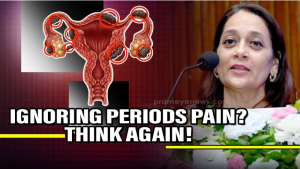Ignoring Period Pain? Think Again – It Could Be Endometriosis

Are you brushing off intense period cramps, bloating, or pelvic fatigue as just “normal”? Think again!
Severe menstrual pain might be a sign of endometriosis, a common yet underdiagnosed condition that impacts millions of women and can lead to infertility.
Imagine facing exhausting cramps, bloating, and chronic pain every month, only to be dismissed or told to “tough it out.” Then, when you’re ready to start a family, you discover that getting pregnant isn’t easy. This is the harsh reality many women with undiagnosed endometriosis face.
What is Endometriosis and Why Is It Ignored?
Endometriosis occurs when tissue similar to the uterine lining grows outside the uterus—affecting the ovaries, fallopian tubes, bladder, and even the intestines. It causes chronic inflammation, internal scarring, and can block fallopian tubes—making conception a real challenge.
Sadly, many women suffer in silence for years because endometriosis symptoms are often dismissed as “just bad period pain.” But this condition can begin even before the first period, manifesting as severe pelvic pain, fatigue, or digestive issues in young girls. Lack of awareness delays diagnosis and leads to long-term consequences—including mental health struggles. Research shows 15% to 20% of women with endometriosis develop depression due to ongoing pain and delayed support.
Fertility and Endometriosis: Can You Still Get Pregnant?
Yes—you can! Endometriosis doesn’t always mean you can’t conceive. But early detection and personalized care are essential.
Renowned gynecologist Dr. Sujata Kar explains,
“Endometriosis is often misunderstood and overlooked, leading to years of unnecessary suffering. Raising awareness and ensuring early diagnosis can make a significant difference in managing symptoms and preserving fertility. No woman should have to endure this pain in silence.”
Treatment Options for Endometriosis and Infertility:
- Hormonal therapy – Balances hormones, manages symptoms, and improves fertility chances
- Pain management – Helps reduce daily discomfort and improve quality of life
- Laparoscopic surgery – Removes abnormal tissue to enhance natural conception
- IVF (In Vitro Fertilization) – Increases chances of pregnancy when other methods fail
- Diet & lifestyle changes – Anti-inflammatory foods, regular exercise, and stress relief can support healing
- Fertility preservation – Options like egg freezing allow for future pregnancy planning
Don’t Suffer in Silence
Endometriosis is not “just painful periods”—it’s a real reproductive health condition that requires medical attention.
If you have chronic pelvic pain, heavy periods, painful intercourse, or unexplained infertility, don’t ignore the signs.
Timely diagnosis and care can help preserve your fertility and improve your quality of life.
With the right endometriosis treatment, many women go on to conceive and become mothers. You are not alone—stay informed, seek support, and don’t lose hope.
